|
|
|
Sort Order |
|
|
|
Items / Page
|
|
|
|
|
|
|
| Srl | Item |
| 1 |
ID:
091427
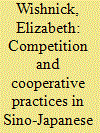

|
|
|
|
|
| Publication |
2009.
|
| Summary/Abstract |
This article reexamines the conventional wisdom that characterizes Sino-Japanese energy relations as predominantly competitive, but views Sino-Japanese environmental relations as essentially cooperative. Using sociological theories of risk, it is argued that Sino-Japanese cooperation is more likely in both the energy and environmental areas when common risks are perceived and relative gains are minimized. Despite their many conflicting strategic, political, and economic interests, as energy importers who are vulnerable to supply interruptions in the Middle East and competitors for global energy supplies, China and Japan share common risks to their energy security. Consequently, there actually may be increasing opportunities for China and Japan to address their common concerns through bilateral and multilateral cooperative practices, such as common positions on pricing or energy conservation initiatives. Although one would expect China and Japan to highlight their mutual interests in tackling environmental problems such as air pollution, in fact relative gains often impede cooperation. Japan increasingly views China as an economic competitor and is reducing environmental aid, while China continues to set a priority on economic growth, which sets limits on the use of costlier Japanese green technologies. By examining a selection of scholarly articles, reports and newspaper articles by Chinese and Japanese analysts, as well as material from interviews in Beijing and Tokyo in May-June 2007, the paper shows how environmental and energy issues in Sino-Japanese relations may be framed as threats, requiring counter-measures, or common risks, which can be addressed through cooperative practices. Lastly, the paper discusses the possibility of the development of an energy security 'risk community' as cooperative practices develop between China and Japan. Nonetheless, conflicting political interests, strategies, and self-images, accentuating relative gains, may provide obstacles to their cooperation in both energy security and environmental protection.
|
|
|
|
|
|
|
|
|
|
|
|
|
|
|
|
| 2 |
ID:
082385
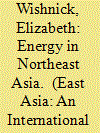

|
|
|
|
|
| Publication |
2008.
|
| Summary/Abstract |
Although Northeast Asia typically is seen as an arena for conflict over energy supplies, complementary economic relationships would seem to make the region ripe for energy cooperation: Russia possesses major oil and gas resources, while China, Japan, South and North Korea all depend on imported energy. The four papers in this issue raise a number of important and, at times, neglected issues about the prospects for energy cooperation in Northeast Asia. While focusing on specific projects for energy supply and conservation, the authors implicitly raise broader theoretical questions about the prospects for and consequences of regional energy cooperation
|
|
|
|
|
|
|
|
|
|
|
|
|
|
|
|
| 3 |
ID:
151440
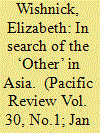

|
|
|
|
|
| Summary/Abstract |
This paper argues that Russia and China are partners of consequence and that the neglect of the normative dimension of the Sino-Russian relationship has led its impact on global governance to be undervalued and misunderstood. Following a constructivist approach, the paper examines the shared norms underlying an ever closer Sino-Russian partnership, despite divergent interests in a number of areas. A first section examines how shared norms lead Russia and China to define their identity similarly, facilitate joint actions, and constrain their individual policy choices. For Russia, elaborating its own unique identity is crucial to its claim to global status, though complicated by interactions with multiple ‘Others.’ Russia's effort to engage Asian partners is often viewed as hedging against China, but as second section argues that Russian engagement in Asia is better understood in terms of Russia's effort to define an Asian identity. A third section highlights the securitization/desecuritization dynamic in Sino-Russian economic relations. Xi Jinping's efforts to redefine China's global role reinforces its tendency to desecuritize the vulnerabilities that lead China to seek economic cooperation with Russia. Russia, fearing becoming a ‘resource appendage’ of China, then securitizes economic relations with China.
|
|
|
|
|
|
|
|
|
|
|
|
|
|
|
|
| 4 |
ID:
145433
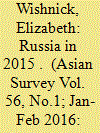

|
|
|
|
|
| Summary/Abstract |
Russia’s cooperative approach to Asia contrasts with its assertiveness in Europe and the Middle East, though the Russian military also has made provocative maneuvers near Japan and US Pacific bases. Ukraine may be far from the Asia-Pacific, but the Ukrainian conflict also casts a shadow on Russia’s Asia policy.
|
|
|
|
|
|
|
|
|
|
|
|
|
|
|
|
| 5 |
ID:
160715
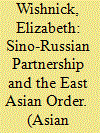

|
|
|
|
|
| Summary/Abstract |
After dismissing the Sino-Russian partnership for the past decade, scholars now scramble to assess its significance, particularly with US foreign policy in disarray under the Trump administration. I examine how China and Russia manage their relations in East Asia and the impact of their approach to great power management on the creation of an East Asian order. According to English School theorist Hedley Bull, great power management is one of the ways that order is created. Sino-Russian great power management involves rule making, a distinctive approach to crisis management, and overlapping policy approaches toward countries such as Burma and the Philippines. I conclude with a comparison between Sino-Russian great power management and the US alliance system, note a few distinctive features of the Trump era, and draw some conclusions for East Asia.
|
|
|
|
|
|
|
|
|
|
|
|
|
|
|
|
|
|
|
|
|